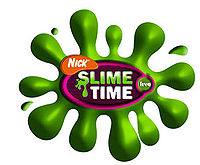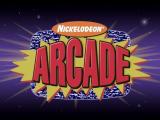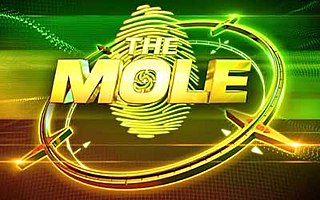
Eye Guess is an American game show created by Bob Stewart and hosted by Bill Cullen that aired on NBC from January 3, 1966, to September 26, 1969. The game combined a general knowledge quiz with a Concentration-style memory element, in which the answers were shown to the players and their recall of their positions was tested.

Think Fast is an American children's game show which aired on Nickelodeon from May 1, 1989, to March 30, 1990, with reruns airing weekly until June 29, 1991.

Masters of the Maze is a children's television game show that aired on the Family Channel from August 29, 1994, to September 15, 1995. After the last episode aired, the show went into reruns until September 22, 1996. The first season was hosted by J.D. Roth, and the second season was hosted by Mario Lopez.

Slime Time Live is a television show that aired on Nickelodeon from 2000–2004, lasting 8 seasons. During its run it was hosted by Dave Aizer, Jonah Travick, and Jessica Holmes and produced/directed by Jason Harper. It was located outside of the former Nickelodeon Studios at Universal Studios Florida. It mainly aired as filler during regular commercial time.
A*mazing is an Australian children's television game show that aired between 16 May 1994 until 1998 on the Seven Network. It was famous for a relatively large and elaborate maze/obstacle course that was part of the show's studio set. A*mazing was hosted by James Sherry for the entire run of the series. A*mazing was produced at Channel 7 in Brisbane from 1994 to 1996 and then at Channel 7 in Perth from 1997 to 1998.

Game Ka Na Ba?, formerly Pilipinas Game Ka Na Ba is a Philippine game show created by ABS-CBN Studios. The main goal of the game is to win 2 million pesos by answering trivia questions.
The Money Maze is an American television game show seen on ABC from December 23, 1974, to June 27, 1975. The show was hosted by Nick Clooney and was announced by Alan Kalter. It was produced by Daphne-Don Lipp Productions, of which Dick Cavett was a principal.

Miljoenenjacht, officially Postcode Loterij Miljoenenjacht, is a Dutch game show, sponsored by the country's postcode lottery, where a contestant and at-home viewer could win up to €5,000,000 or as little as €0.01. The show is broadcast at various times, spanning across six episodes for each set. The program was originally shown by TROS on NPO 2, but moved to creator John de Mol's channel Tien in 2005. After the channel was discontinued after its sale to the RTL Group, the program moved to RTL 4. In 2019, the program moved to SBS6 due to the transfer of Linda de Mol from RTL to SBS.
Skedaddle is a children's game show that aired in late 1988 for six weeks as a part of The Funtastic World of Hanna-Barbera block of shows. It was hosted by guest star Ron Pearson, and created by William Hanna and Joseph Barbera. The show was executive produced by Hanna and Barbera, along with Jay Wolpert for the autumn season being aired for eight months.

The first season of The Mole aired on ABC in 2001. It was produced by Stone Stanley Entertainment and was released to DVD by Eagle Rock Entertainment on March 8, 2005. The season was hosted by news reporter Anderson Cooper and featured American contestants; it was filmed mainly in France, Monaco, and Spain. Adapting the format of Belgian reality game show De Mol, many challenges and locations were inspired by their counterparts from De Mol's second season in Spain.
Celebrity Mole: Yucatán is the fourth season of the American version of The Mole and aired from January 7 to February 18, 2004. It was filmed on the Yucatán Peninsula in Mexico, and based primarily at the Occidental Grand Flamenco Xcaret Resort. Filming was done in the fall of 2003.

Nick Arcade is an American children's game show created by James Bethea and Karim Miteff and hosted by Phil Moore, with Andrea Lively announcing, that aired on Nickelodeon in 1992. It aired originally during weekend afternoons, with reruns airing until September 28, 1997. In the first season, the shows were taped in December 1991 and aired in early 1992. It was taped at Nickelodeon Studios at Universal Studios Florida in Orlando, Florida. In Nick Arcade, two teams of contestants played two initial trivia rounds, with the winning team advancing to the "Video Zone" to play against the virtual "Video Game Wizard" of the day.

Bezzerwizzer is a trivia game based on answering questions belonging to a number of categories drawn at the beginning of the drawn. The game was invented in 2006 by the Dane Jesper Bülow. The game's name is a pun on "Besserwisser", a German term meaning "better knowing" or a "know-it-all".
Nickelodeon All-Star Challenge is a three-episode game show television special that aired during The Big Help on October 3, 1994.
Family Feud was an Australian game show based on the American show of the same name. The program ran on the Nine Network from 1978 to 1984, and on the Seven Network from 1990 to 1996. The program has been revived twice, in 2006 and 2014.
Family Game Night is an American television game show based on Hasbro's family of board games and EA's video game franchise of the same name. The show was hosted by Todd Newton. Burton Richardson was the announcer for the first two seasons; he was replaced by Stacey J. Aswad in the third season, and Andrew Kishino was hired for the fourth season. The 60-minute program debuted on October 10, 2010, on The Hub ; it was previewed on October 9, 2010, on its sister channel, TLC. Seasons 1 and 2 contained 26 and 30 episodes respectively. Seasons 3, 4 and 5 each contained 15 episodes. Season 2 premiered on Friday, September 2, 2011, with additional games being added. The games added to the second season included Cranium Brain Breaks, Green Scream, Ratuki Go-Round, Simon Flash, Operation Sam Dunk, Trouble Pop Quiz, and Spelling Bee. However games from the previous season were still kept.

Scrabble Showdown is an American game show created for the American cable network The Hub. The program was based on the board game Scrabble and was hosted by Justin Willman. It ran from September 3, 2011, to April 15, 2012.
Blockbusters was an Australian children's game show, broadcast on the Seven Network, where players from two schools competed over the course of a week, in a rolling format, where games could be started in the middle of an episode, and stopped and continued on the next episode. The school team earning the most points won a major prize for their school, such as an encyclopedia. The show was hosted by Michael Pope. It ran in Australia from 1991 to 1994.

The sixth season of the Australian version of The Mole took place in various locations around Australia, and was hosted by Shura Taft.

Ellen's Game of Games, also known as Game of Games and stylized as ellen's GAME OF GAMES, is an American television game show that aired on NBC. In March 2017, NBC ordered six hour-long episodes of the series. Ellen DeGeneres serves as host, while Stephen "tWitch" Boss appears as announcer/sidekick. The series is based on game segments from DeGeneres' daytime talk show, The Ellen DeGeneres Show. The series premiered on December 18, 2017. On February 18, 2020, DeGeneres announced on The Ellen DeGeneres Show that the series was renewed for a fourth season, which began airing on October 6, 2020. In January 2022, the series was canceled after four seasons.











